We are developing the social individualist meta-context for the future. From the very serious to the extremely frivolous... lets see what is on the mind of the Samizdata people.
Samizdata, derived from Samizdat /n. - a system of clandestine publication of banned literature in the USSR [Russ.,= self-publishing house]
|
Clive Davis, writing for TCS last week, has some sad news for his American friends:
Mrs. Miniver is dead. The funeral was held some time ago, and there were not many mourners in attendance.
Mrs. Miniver being a character in a Hollywood film that represented all that was best about war-time Britain and Middle England. Looking beyond the pageantry of the Anglosphere, a different picture emerges:
Immediately after 9/11, much was made of such ceremonial gestures as the playing of “The Star-Spangled Banner” at the Changing of the Guard. Dig a little deeper, though, and there’s no mistaking the hostility to American values among large sections of the British population. Conservative commentators in the US have got plenty of mileage out of jibes at French anti-Americanism; the unpleasant truth is that Britain is home to a similar phenomenon.
Why the hostility? When did this happen and why? My experience supports Clive’s view to some extent. Although I tend to move in circles where America may be criticised for some things but respected for many of its qualities, I am often taken aback by latent anti-Americanism when talking to people outside those circles. The most annoying thing about such attitude is that it is emotive, not based on anything other than some misplaced zen-like view of the world. Well, you know, there should be some counter-balance to the US power… . As Clive quite rightly notes it is a potent mix of ignorance and arrogance that feeds the Middle England’s political cosmology. (Or shall I say astrology…)
Perhaps as a consequence of all those hours spent sighing over Hugh Grant, Americans tend to assume that British are much more worldly and sophisticated than they really are. The truth is, when it comes to knowledge of American history and institutions, the Brits are woefully uninformed. What they are familiar with is American popular culture, which is – as I don’t need to remind you – a different thing all together. The result of that false sense of familiarity is a toxic combination of ignorance and arrogance. Besides, the British middle classes (like many of their counterparts in the US) do not necessarily see American popular culture as an unmitigated force for good. As the cultural critic Martha Bayles observes in an essay on public diplomacy in the latest edition of the Wilson Quarterly: “Popular culture is no longer ‘America’s secret weapon.’ On the contrary, it is a tsunami by which others feel engulfed. ”
Indeed, the thing that seems to gall the British chattering classes and, at the same time, helps them maintain their sense of superiority is the impression that Americans are, oh so, stupid. I find myself replying with increasing frequency that in a country where people are free to be as triumpantly stupid, it also means that they are free to be triumphantly creative and innovative.
Update: Clive posted comments emailed by readers of the TCS article on his blog.
And that is exactly what Kamal Aboukhater, the producer of the movie Blowing Smoke, has just done. He has produced the film his way – deeply un-PC screenplay about cigars, men and women using cutting-edge digital technology – and now he is releasing the movie via the Blowing Smoke blog.

So having done all that, getting good people on my side working with me, I didn’t want to become a slave to anyone. I didn’t want to wait for my movie to travel up the long and tedious chain of command until someone finally made a decision to release it.
… There will be no waiting. I can, audience willing, get immediate response and won’t be at the mercy of a movie studio or distributor. One thing I have learned about audiences, thanks to blogs, is that they are not a unified mass of “consumers.” They are individuals, choosing something (like what to watch) for many and varied reasons. Some might want to watch Blowing Smoke because they like cigars, some might be drawn to the poker, and others may want their opinions about women and men confirmed. Whatever the reason, now they can do so easily. And, if they feel like it, they can let me know their reactions and opinions.
And he really does not like the studios, but he seems to like bloggers:
Major studios seem to be the last to adopt and adapt to innovation and trends. And, just like with video and DVDs, they are again missing the boat, unaware of the new possibilities for reaching their audiences. They might have caught glimpses of the future, such as Firefly, Global Frequency, and Garden State. This is thanks to a new band of warriors, better known as bloggers, who add strength to the voice of the fans, fighting for more choice for themselves and, in the end, all of us.
The point is that he can go all the way to his audience, by-passing the intermediaries. Sure, the path is not clear, the journey may be either uneventful or too bumpy, but Kamal is aware of the experimental nature of what he has done. He is enjoying the comments from those who understand and appreciate what he is trying to do. As he said after the ‘launch’:
It’s no longer just about the movie but about an opportunity to add another dimension to the infrastructure that’s already there – the blogosphere and the internet.
It has taken a while to get to this point both in terms of understanding and then realising the idea. I feel privileged to have been part of that process and enjoy working with Kamal whose open mind has been instrumental in this adventure. In return, he can be blamed for my blossoming addiction to cigars, the quality of which would make any cigar afficionado weep with joy. Whilst discussing the final details of the Blowing Smoke ‘release operation’, I savoured a particularly good Hoyo de Monterrey. Who says the days of plotting in smoke-filled rooms are over…
I shall leave you with an exhortation: Boxed BS available now! Get your own! Oh and, BS download is Coming Out Real Soon Now!
cross-posted from Media Influencer
I know this post is not ‘on topic’ in these days of Islam casting its shadow over the Western society but it is tonight I am watching Doctor Zhivago.
I remember reading the book by Boris Pasternak in 1980s, as a teenager. I got only about 70% of it because I was too young. Despite the fact that I was living in deep communism. I guess that was the reason I understood even that much of the story, at the tender age of 14… Never mind the love story – it is the backdrop that interests me. The Russian Revolution of 1918.
The film shows the destraction of an individual, educated and sensitive, a doctor and a poet. Not a perfect human being by far, who loved his country and saw it and his life rent apart by a brutal change, his loved ones in danger and all he treasured destroyed.

Let me relay some snippets that I found memorable.
Zhivago’s house in Moscow has been taken over by the local Soviet run by two sour-faced comrades. They tell him, reproachfully, that there is room for 13 families there. He says: In that case, this is a better arrangement. More just…
Doctor Yuri Zhivago was a member of the Russian intelligentsia and believed that there was a need for reform of the country. At the start, he saw the Communist Party as performing a deep operation cutting out a cancerous tumour. Today he probably would be reading the Guardian or the New York Times calling himself a progressive. A bleeding heart liberal, perhaps. But Pasternak puts the Zhivago character through the reality of a dystopia coming true.
There is a conversation between Doctor Zhivago and Strelnikov, a commander of the Red Guard of legendary reputation, the scourge of the country.
Strelnikov: Are you the poet? I used to admire poetry, it’s so personal, the flight of affections and humanity. Personal life is dead in Russia. I can see how you could hate me.
Zhivago: The fact I hate you, does not mean I want to kill you.
And later in the same conversation:
Zhivago: You burnt the wrong village.
Strelnikov [agitated]: A village is burnt, the point is made.
Yes, I remember the stern self-righteousness (or more accurately a psychotic moral high-ground), the fragile power that many experienced until they were the next batch to be devoured by the monstrous system. The glorious Party, the Workers, the Justice, Equality and the Better Tomorrow… airbrush the Gulags and you have the Guardianistas…
And then there is the nihilism of the ‘revolutionaries’.
Tonya’s (Zhivago’s wife) father: They shot the czar and all his family… [exclaims] What’s it for?
Zhivago: To show that there is no going back…
A young boy is found dying in the field after the attack of the partisans who kidnapped Zhivago for his medical expertise. The boy dies while Zhivago looks sadly on unable to save him. A partisan says:
It does not matter.
Zhivago: Did you ever have any children?
Partisan: I once had a wife and four children. None of this matters.
Zhivago: What matters, commander?
Partisan: Tell me, I have forgotten.
Towards the end of the film, Zhivago’s brother says of Lara, his lover:
She vanished and died somewhere in one of the labour camps. A nameless number on a list that was afterwards mislaid…
Watching the film reminds me of what an unqualified and unchecked evil the Soviet Revolution and communism was. Horrific in its suppression of the individual, ruthless in its ritual extinguishing of the human spirit and freedom, terrifying in its imposition of the most toxic variety of dystopia, arrogant in its denial of reality and brutal in the execution of those who dared even breathe against it. Evil, pure evil that will never be fully understood by those who have not experienced it.
Yeah, I should have gone out on Saturday night…
The UN rears its ugly head again as an international political spat is brewing over whether the United Nations will seize control of the heart of the Internet. By ugly I mean those members of the UN whose rule at home has nothing to recommend them such as Syria, China or Ghana. They claim that the U.S. government has undue influence over how things run online. Now they want to be the ones in charge.
One of the things at issue is who decides key questions like adding new top-level domains, assigning chunks of numeric Internet addresses, and operating the root servers that keep the Net humming.
But this is the bit that opens the knife in my pocket.
Other suggested responsibilities for this new organization include Internet surveillance, “consumer protection,” and perhaps even the power to tax domain names to pay for “universal access.”
I know that there is not much love lost for ICANN (the Internet Corporation for Assigned Names and Numbers, established to handle some of those topics, but these kind of noises from the UN represent a political challenge as they come from predictable corners. CNET news.com provides excerpts from a transcript of a recent closed-door meeting in Geneva convened by the UN’s Working Group on Internet Governance that offers clues about the plot to dethrone ICANN. Please note the sophistication and understanding of internet and the related issues by the participants:
Syria: “There’s more and more spam every day. Who are the victims? Developing and least-developed countries, too. There is no serious intention to stop this spam by those who are the transporters of the spam, because they benefit…The only solution is for us to buy equipment from the countries which send this spam in order to deal with spam. However, this, we believe, is not acceptable.”
Brazil, responding to ICANN’s approval of .xxx domains: “For those that are still wondering what Triple-X means, let’s be specific, Mr. Chairman. They are talking about pornography. These are things that go very deep in our values in many of our countries. In my country, Brazil, we are very worried about this kind of decision-making process where they simply decide upon creating such new top-level generic domain names.”
China: “We feel that the public policy issue of Internet should be solved jointly by the sovereign states in the U.N. framework…For instance, spam, network security and cyberspace–we should look for an appropriate specialized agency of the United Nations as a competent body.”
Ghana: “There was unanimity for the need for an additional body…This body would therefore address all issues relating to the Internet within the confines of the available expertise which would be anchored at the U.N.”
So the usual ‘control-and-destroy’ approach of the UN scum. Can they do anything about it? Apparently there is the nuclear option .
Beyond the usual levers of diplomatic pressure and public kvetching, Brazil and China could choose what amounts to the nuclear option: a fragmented root. That means a new top-level domain would not be approved by ICANN–but would be recognized and used by large portions of the rest of the world. The downside, of course, is that the nuclear option could create a Balkanized Internet where two computers find different Web sites at the same address.
Declan McCullagh, the author of the article, believes that such an outcome remains remote, but possible, which turns an obscure debate about Internet governance has suddenly become surprisingly important. I hope the US does not let go…
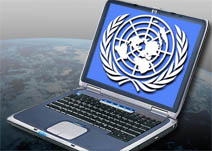
Rebecca MacKinnon blogs about her communication with Ethan Gutmann, author of Losing the New China: A Story of American Commerce, Desire and Betrayal.
One of the chapters is about Cisco’s business in China and the extent to which they actively supply Chinese law enforcement with censorship and surveillance technology. Cisco denies, Gutman responds by making available Cisco brochure from the China Information Infrastucture Expo 2002. There is also a very sound argument about why this matters and why Cisco (or anyone else) should not be allowed to get away with profiting from assisting the state to surpress the freedom of individuals. That is the kind of ‘social responsibility’ I can support.
As you know, the Chinese authorities don’t want to block the web. They want Chinese users to practice self-censorship. Surveillance, and the awareness of surveillance leads to self-censorship and that’s where Cisco comes in. Cisco has built the structure for the national PSB [Public Security Bureau] database, and as of June 2003, it is already resident in every province of China, except Sichuan. Police can access a suspect’s political history, imaging information, the lot, and read their email at will. Cisco calls it “Policenet”.
This is the scary stuff of Panopticon. The real deal that the combination of the totalitarian nature of the Chinese government and technology has made possible. The argument that if Cisco does not follow the ‘demand’ created by the Chinese authorities, someone else will, does not hold – it absolves businesses (and those individuals responsible for them) from the physical and moral consequences of their actions.
via Instapundit
I will refuse to register for an ID card and will donate £10 to a legal defence fund but only if 10,000 other people will also make this same pledge.
– Phil Booth, NO2ID National Coordinator at PledgeBank
Deadline is 9th October 2005, 2,934 people have signed up, 7066 more are needed. Those in the UK, please sign up.

Today’s reason for light blogging is that the Samizdata editors are in Paris(!) attending a blogging conference Les Blogs. Blogging is making some waves in France and this conference is truly international, bloggers from 20 countries are present. We have met many a blogger we have known virtually and putting faces to blogs is always an interesting experience.
For those who are interested in the blog trends and biz, head over to the Big Blog Company blog for some furious blogging of the conference.
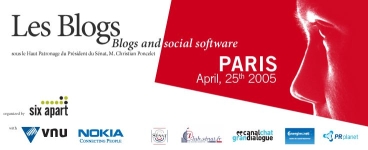
It was so much easier to blame it on Them. It was bleakly depressing to think that They were Us. If it was Them, then nothing was anyone’s fault. If it was us, what did that make Me? After all, I’m one of Us. I must be. I’ve certainly never thought of myself as one of Them. No one ever thinks of themselves as one of Them. We’re always one of Us. It’s Them that do the bad things.
– Terry Pratchett, Jingo
It is often said that, in polite company, one should not discuss politics and religion. Samizdata does not pay heed to the first one and Brian and Jonathan have blown the second one, so I should be on safe ground.
Every year, at the Easter Vigil, a most spell-binding melody is sung during the liturgy. Last night, as every year, I listened to Exsultet chanted, this time at the church of Our Most Holy Redeemer and St Thomas Moore, in the darkness with only candles illuminating the entire church. Its purpose is to rejoice in the resurrection and marks the begining of Easter Celebrations. (Let’s hear it for the barbaric Christian rituals.)
Exsultet of Easter Vigil is certainly my favourite piece of both poetry and music, with Allegri’s Miserere coming close second. The orignal text, going back as far as St. Ambrose (4th century), entered the Roman tradition around the 9th-century as part of Gregorian chant tradition. It is a masterpiece of the liturgical tradition.

It is said to be the sublimest expression of joyful sound that has ever come from the human heart and mind. Mozart once said that it is the most beautiful music ever written and that he would have given all his works to be able to say that he had written the first line of the Exsultet.
I could not find a decent audio file that conveys its full beauty and impact, but I found the text and the music score.
Update: Here is an audio recording of the Latin version.

Today I heavily undermined my Samizdatista credentials by hanging around the political types. I attended a lunch for Boris Johnson’s, MP, supporters and activists from his constituency. Now, you may ask what I was doing there… well, blogosphere works in mysterious ways…
The lunch was rather pleasant and I found those I had a chance to talk to refreshingly switched on and open-minded. The shock was made bearable by copious food and wine.
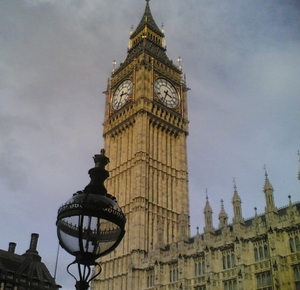
The politicians’ lair Now, to the heart of the matter, Mr Boris Johnson, MP. I was most intrigued, after many months of Tory bashing on this blog, to find myself on the inside and on the receiving end, so to speak. Although the House of Commons is not an unknown territory, this occasion was different as I went curious to meet the one Tory that seems to break the ranks and is not afraid to mention the notion that dare not speak its name in current politics – freedom.
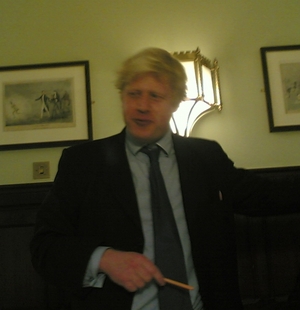
Boris, the Strangely Illuminated Statesman The speech Mr Johnson gave at the end of the lunch, before he had to dash off to his statesmanly duties, was… excellent. This is what he had to say (reconstituted from my, by now largely unreadable notes, so please give the man a break and challenge me on the detail):
There were three points to note. The first was that freedom is important and needs to be seen as an end in itself, to stop its erosion for other political ends. The Labour government has been spending an increasing amount of taxpayers’ money while reducing their freedom. This is bad for the society. The result is an even more intrusive state under Labour. [So far, so good.]
Boris called for a new style of government, which would get that freedom back. He mentioned a rather scary statistic, the size of the public sector is now at the same level as in the 1979 – when Thatcher came in, ending an era of rampant and shameless socialism in Britain – and is 739,000 people working for the central government (excluding local government and other public bodies). By the time Labour came in the number had shrunk to 430,000. The Tories’ agenda is to shrink the size of the state again.
The second point was democracy. Democracy means that the Tories get rid of unelected regional authorities and the whole tier of government that has not been approved by the democratic processes. The term constitutional non-sense was mentioned in the context of the health secretary having no say about health.
The third issue was taxpayer value. Huge quantities of taxpayer money have been lavished on the public sector and on socially useless projects. New approach to government is needed. [I especially like this one – it was mentioned twice.] Mr Johnson got rather animated when he called for a stop of the ongoing transfer of wealth from the productive sector of the economy to the non-productive. I hope this was a go at wealth redistribution, as his moved on to recommend that the Tories should the party of lower taxation.
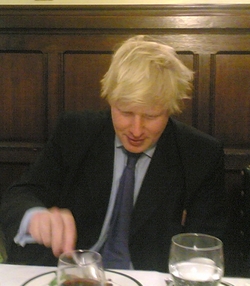
Mr Johnson understands that the size of the cake is more important that the equal size of the cake portions
There was the usual pep talk before the elections, which did not come out too badly as it was based on realistic expectations and the belief that Tony Blair should be expelled from the office, which is impossible to disagree with.
More issues were discussed, which are either too local or related to the constituency and as such would probably bore the pants off our ‘global’ readership. All in all, talking to Mr Johnson, one could almost believe that politics can be a way forward. They must have put something in the wine…
Due to sheer coincidence of seating arrangements I had a chance to exchange a few words with our Honourable Friend and mentioned the distinction between the state and the society that dictates so much of our ‘editorial policy’ on political engagement. It seemed to resonate and I could not help but wonder to what extent the Tory party message could coalesce around such a notion. For the record, I am not holding my breath.
The Royal Society of Chemistry is to honour author and critic of scientists George Orwell with a search for the perfect way to make his favourite drink.
Orwell was an expert not only on the Big Brother but also on tea – another important aspect of the British society. His 1946 essay A Nice Cup of Tea laid down 11 steps to the perfect brew, and was a reaction to a lack of guidance on tea-brewing in cook books: “This is curious not only because tea is one of the mainstays of civilisation in this country.., but because the best manner of making it is the subject of violent disputes.”
According to Orwell tea should be drunk strong, without sugar and from a cup with a round bottom. It should be poured before adding milk, he insisted, entering a debate that has caused acute controversy within the tea-etiquette world.
Archbishop Desmond Tutu has attacked Tony Blair for his “mind-boggling” support for the US over a possible war in Iraq. He was shocked and saddened America was being “aided and abetted” by Britain as the British Government is expected to announce later this week that it is planning to deploy troops to the region, reportedly numbering 27,000. When does compassion, when does morality, when does caring come in? The dissident frogman has an excellent take-down of such idiotarian rhetoric.
|
Who Are We? The Samizdata people are a bunch of sinister and heavily armed globalist illuminati who seek to infect the entire world with the values of personal liberty and several property. Amongst our many crimes is a sense of humour and the intermittent use of British spelling.
We are also a varied group made up of social individualists, classical liberals, whigs, libertarians, extropians, futurists, ‘Porcupines’, Karl Popper fetishists, recovering neo-conservatives, crazed Ayn Rand worshipers, over-caffeinated Virginia Postrel devotees, witty Frédéric Bastiat wannabes, cypherpunks, minarchists, kritarchists and wild-eyed anarcho-capitalists from Britain, North America, Australia and Europe.
|













